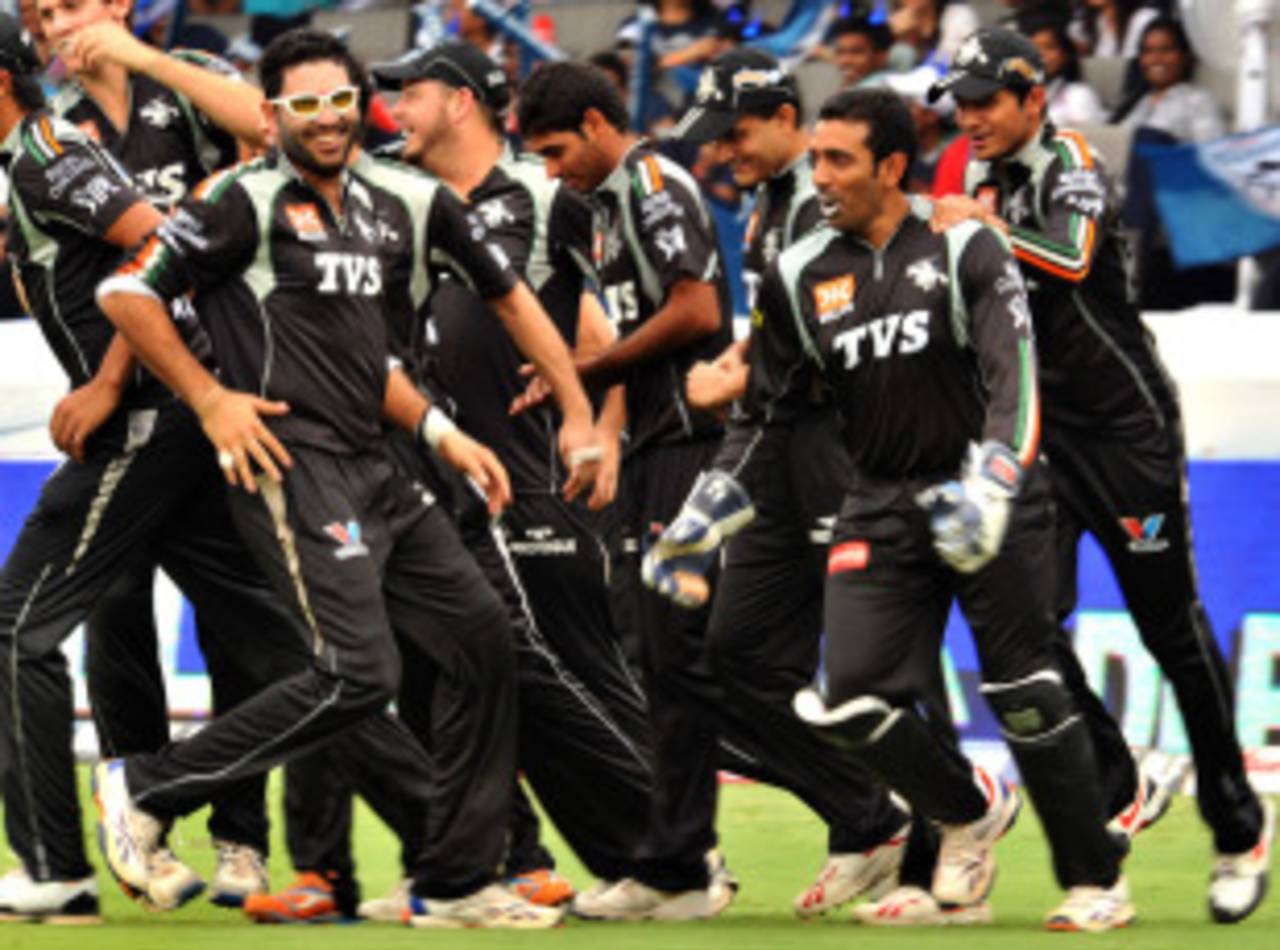Franchises perturbed by Sahara pullout
A number of IPL franchises have expressed concern about the potential damage to the IPL's image from Sahara Pune Warriors' abrupt withdrawal from the league
Tariq Engineer
05-Feb-2012

Uncertainty over the Pune Warriors' participation in IPL 2012 could deter sponsors • AFP
A number of IPL franchises have expressed concern about the potential damage to the IPL's image from Sahara Pune Warriors' abrupt withdrawal from the league, with some saying the decision might make sponsors think twice about associating with the tournament in the future. An hour before the player auction on Saturday, Sahara India Parivar cut its ties with the BCCI, withdrawing its sponsorship of the Indian team and its ownership of the IPL Pune franchise. The announcement took the other franchises "completely by surprise" and has thrown the schedule and format of the tournament into doubt again.
"When a franchise like this walks, it is not good for the league," a team administrator told ESPNcricinfo. While he said allowances must be made as the IPL is a new product and, as with any new business, there will be teething problems, he said the reasons "why this is happening are not good".
The Pune Warriors are the fourth team over the past 18 months whose status ahead of an IPL season remains unclear. In 2010, the BCCI terminated Rajasthan Royals and Kings XI Punjab but they took the board to court and won the right to participate in the 2011 IPL. Last September, Kochi Tuskers Kerala became the third team to be terminated, though one of the team's co-owners said last week that they plan to file a case of their own in court and are confident of being part of the 2012 season despite their players having been sold to other teams.
It is this uncertainty over which teams will be part of the league, franchises said, that sends the wrong signal to sponsors and partners. No business likes uncertainty. Franchises typically sign multi-year deals with their sponsors. But if a sponsor can't be sure the team they are backing will remain in the league, they are going to be jittery about committing their money and resources.
The operational details of the IPL - number of matches, dates etc - are up in the air as well but, beyond the logistics, it is the constantly shifting goalposts that add to the confusion. It renders decision-making by both franchises and their partners more difficult because the underlying factors that determine those decisions are unclear. A sponsorship deal for a team that plays 14 matches will naturally differ from one for a team that plays 18 matches. If you can't be sure of the number of matches, it becomes that much harder to put a value on a contract.
Adding to the league's concerns is the fact that the 2011 IPL produced the lowest television ratings of any of the four seasons, an average Television Viewer Rating (TVR) of 3.91 per game, down 29% from 5.51 in 2010. Even the final, which drew a TVR of 6.96, paled in comparison to the 12.85 rating in 2010. It was also the first final to draw a single-digit rating.
Santosh Desai, brand analyst and managing director of Future Brands, said he felt that the 2012 season would be a crucial barometer of the IPL's long-term prospects because of a number of coalescing factors, including the general slowdown of economies around the world and the other problems surrounding Indian cricket at the moment: the national team's poor performances away from home and the loss of the domestic broadcaster. In such a scenario, he said, something like the Warriors quitting the league takes on a larger significance.
"[The IPL] is sentiment-driven. The moment you take away the good cheer, everything looks darker and gloomier. It begs greater scrutiny on the part of the franchises of the harder, more rational aspects of the IPL. From every single quarter there seems to be some reason for doubt. So this could be the most challenging season."
Desai also said a lack of proper governance, going back to when Lalit Modi was the IPL chairman, was part of the problem. "Once you build something, you need a steady hand, someone with a long-term perspective. Auctions are too frequent. If you look at the manner of the BCCI overall, the conflict of interest issues have not been resolved. So certainly governance is an issue."
It's too early, though, to say the IPL itself is in serious trouble. When the NBA went on strike last year, the consensus opinion was that the league's viewership would suffer if and when the league started up again. The strike was eventually called off and six weeks into the 2011-12 season, television ratings are up across the board.
Sahara's issues with the BCCI relate largely to the IPL. In 2008, Sahara's bid for one of the first eight IPL franchises was "thwarted", as it said; in 2010, Sahara successfully bid US$370 million for the Pune franchise but later asked the board for a refund of what it called its "extra bid money" stating that its bid price had been calculated on the basis that 94 matches would be played per season from 2011 onwards but only 74 matches were played last season. Other requests, such as not having player retention to create a "level-playing field" or allowing one extra foreign player for the two new teams were also turned down.
Some are also still hopeful that a compromise can be reached between Sahara and the BCCI. "We sincerely hope the parties come to a consensus and a solution is reached in the best interest of the league and cricket," a franchise official said.
Tariq Engineer is a senior sub-editor at Cricinfo